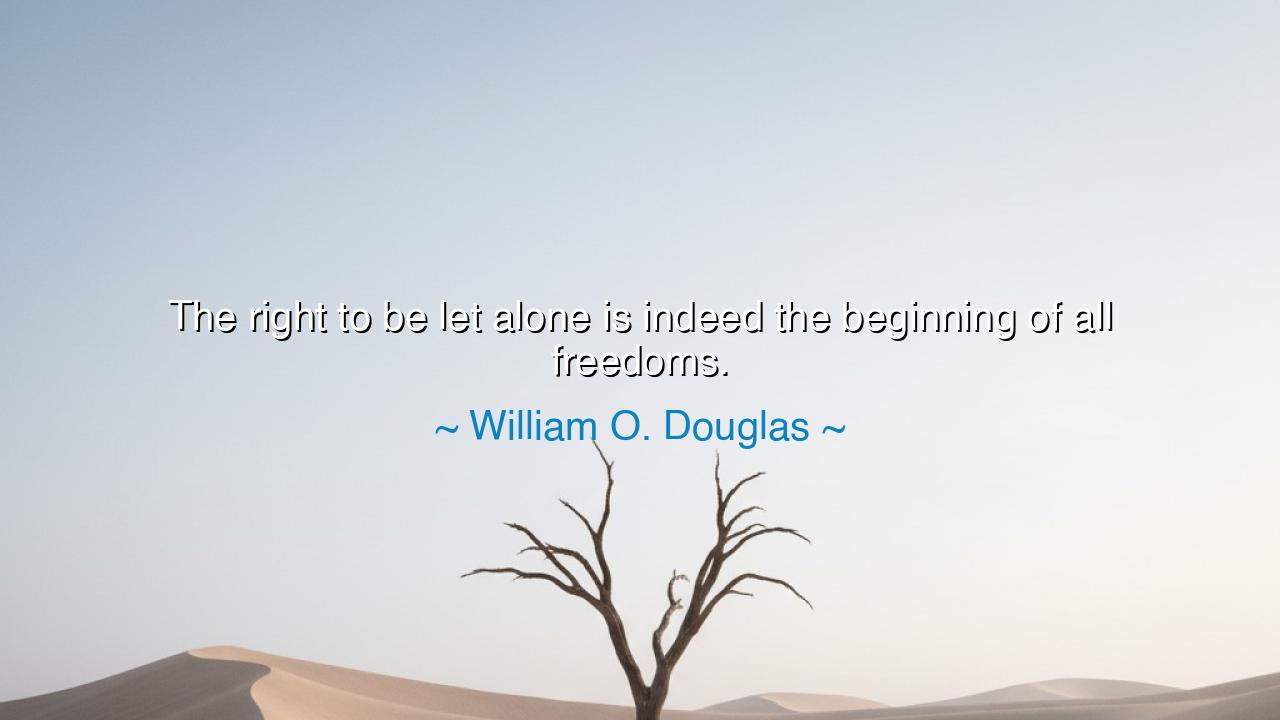
The right to be let alone is indeed the beginning of all






"The right to be let alone is indeed the beginning of all freedoms." These words of William O. Douglas resonate with a deep and profound truth—one that echoes through the ages, for it is in the very sanctity of individual privacy that the foundations of freedom are laid. To be free is not only to act as one pleases, but to be unmolested by the interference of others. It is the right to exist in peace, to live without the constant gaze of the world intruding upon the inner sanctum of the self. This right to be let alone is the first and most sacred of all freedoms, for it is only in solitude and autonomy that we can truly discover our own voice, untainted by external forces.
Consider the ancient philosophers—those who sought wisdom not in the clamor of public life but in the quiet of their minds. Socrates, standing before the people, spoke his truth, yet he often retreated into contemplation, into the quiet spaces where his thoughts could flourish. The right to be alone allowed him to meditate, to inquire, and to challenge the world with his unfiltered ideas. His freedom came not from the applause of the masses, but from his autonomy, his ability to seek truth in silence, away from the distractions and the control of others. It is this solitude, this freedom to be left alone, that nourishes the soul and sparks the fires of wisdom.
The importance of this right can be seen in the stories of countless oppressed peoples throughout history. During the time of the American Civil War, the issue of personal liberty became central to the struggle for freedom. Abraham Lincoln recognized that true freedom meant not only the ability to act but the right to be free from the tyranny of others. The emancipation of slaves was not merely the granting of action but the recognition of their right to live free from constant interference, to have the opportunity to define themselves without fear of domination. This profound recognition of the right to be left alone paved the way for the larger concept of freedom, where one’s personal autonomy became the bedrock of liberty.
In the modern era, this concept of being left alone has only become more vital. The rise of surveillance, the constant intrusion of social media, and the proliferation of data collection systems threaten the very core of our privacy. To be watched constantly, to have every action, every word, and even our thoughts dissected, is to strip away the fundamental dignity of the individual. It is in this erosion of privacy that the spirit of freedom begins to wither, for how can we act freely when we know that we are being monitored at every moment? As William O. Douglas so wisely stated, the right to be left alone is the foundation of all other freedoms—without it, the essence of what it means to be free begins to fade.
The true lesson in Douglas’s words is that the preservation of our personal freedom begins with the recognition and protection of privacy. We must, as individuals, safeguard our right to solitude and our right to be free from unwarranted interference. Just as the great leaders of history fought not only for their right to act but for the space to think, so must we defend the sacred right to be alone, to shape our thoughts and lives without the shadow of constant surveillance and judgment. This freedom of privacy is not merely a legal right, but a moral imperative—a recognition that the soul cannot flourish in a world where every action is scrutinized and every thought is judged.
In our daily lives, we must be ever vigilant in the protection of our autonomy. We must reclaim moments of quiet reflection, ensuring that we are not lost in the distractions of a constantly connected world. We must advocate for policies and laws that protect our right to privacy, that safeguard the sanctity of our personal space, and that honor the freedom to be left alone. When we are free to exist without interference, to live according to our own principles and desires, we are not only living freely but honoring the very sacredness of our human existence.
Let us then take heed of the wisdom that William O. Douglas imparts, recognizing that freedom begins in the quiet corners of our lives, where we can be ourselves without the fear of intrusion. It is in this space that our greatest potential can be realized, for only in solitude can we truly know who we are, what we stand for, and what we hope to achieve. The right to be let alone is the first freedom, the foundation upon which all others are built, and it is a freedom that we must cherish and protect for generations to come.






AAdministratorAdministrator
Welcome, honored guests. Please leave a comment, we will respond soon